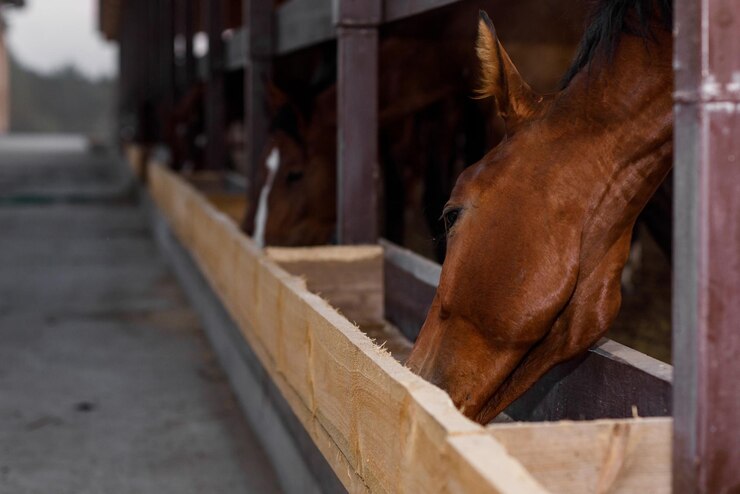When it comes to feeding draft horses, understanding their unique nutritional needs is crucial. These magnificent animals, known for their strength and size, require a diet that supports their energy levels and overall well-being. Ensuring proper nutrition not only aids in maintaining their health but also enhances their performance in various tasks.

The Importance of a Balanced Diet
A balanced diet is fundamental for draft horses. It provides the necessary nutrients for growth, maintenance, and repair. Draft horses are primarily working animals, and their diet should reflect their activity levels. Typically, their diet comprises forage, grains, vitamins, and minerals.
Forage: The Foundation of Their Diet
Forage is the cornerstone of a draft horse’s diet. It includes hay and pasture, which are high in fiber and essential for digestive health. Draft horses require a significant amount of forage daily, usually around 1.5% to 2% of their body weight. Quality hay should be free from mold and dust to prevent respiratory issues.
Grains: The Energy Booster
Grains provide the necessary energy for draft horses, especially those involved in heavy work. Oats, corn, and barley are common grains fed to these horses. However, the quantity should be monitored to prevent obesity and digestive problems. It’s essential to balance grain intake with their workload.
Vitamins and Minerals: Essential Micronutrients
Vitamins and minerals play a vital role in the overall health of draft horses. Deficiencies can lead to various health issues, such as poor coat condition and weak hooves. Supplements like biotin can support hoof health, while electrolytes are essential for hydration, particularly after strenuous activities.
Monitoring Nutrient Intake
Regularly assessing nutrient intake ensures that draft horses receive adequate vitamins and minerals. Consultation with a veterinarian or an equine nutritionist can help tailor a diet plan suitable for the horse’s specific needs.
Special Considerations for Draft Horses
Draft horses, due to their size, have unique dietary requirements. It’s important to consider factors such as age, workload, and health status when planning their diet. Older horses or those with health issues may require specialized feeds or supplements.
Feeding Frequency and Portion Control
Consistent feeding schedules help maintain digestive health. Dividing feeds into smaller, regular meals can prevent colic and other digestive disorders. Portion control is crucial to prevent overfeeding and obesity.
Hydration: A Key Component
Ample supply of clean, fresh water is essential for draft horses. Dehydration can lead to severe health issues, particularly in hot weather or after intense physical activity.
Common Feeding Mistakes to Avoid
Avoiding common feeding mistakes can prevent health issues in draft horses. Overfeeding, underfeeding, and sudden dietary changes are some pitfalls to avoid. Gradual dietary transitions are recommended to prevent digestive upset.
Recognizing Signs of Nutritional Deficiency
Being aware of signs of nutritional deficiency can help in early intervention. Poor coat condition, lethargy, and weight loss may indicate dietary imbalances.
External Resources for Further Reading
For comprehensive information on addressing nutrient deficiencies in horses, visit this resource.

FAQs
What is the best diet for draft horses? A balanced diet of quality forage, grains, and necessary supplements tailored to the horse’s activity level and health status is ideal.
How much should I feed my draft horse? Draft horses typically require 1.5% to 2% of their body weight in forage, with grains adjusted based on workload.
Can draft horses have dietary supplements? Yes, supplements such as biotin and electrolytes can support specific health needs when included appropriately in their diet.
For additional insights into feeding horses with specific needs, check out this article.
This article contains affiliate links. We may earn a commission at no extra cost to you.








